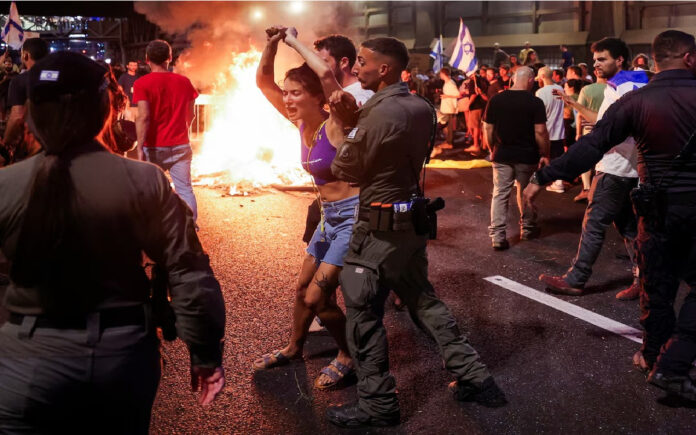Jerusalem: Israeli protests erupted for a second consecutive day, with the largest trade union, Histadrut, calling a general strike to pressure the government into negotiating a deal for the return of hostages held by Hamas. This follows the discovery of six more hostages found dead in Gaza, who authorities say were shot between 48 and 72 hours before being recovered by Israeli forces.
The nationwide strike disrupted transport and medical services across various Israeli districts, causing numerous shops and businesses to close. Histadrut, representing hundreds of thousands of workers, initiated the stoppage to escalate the demand for action from the government.
The recovery of the six hostages triggered widespread grief and anger, leading to mass demonstrations in Jerusalem and Tel Aviv on Sunday, where approximately half a million people protested. The demonstrators are urging Prime Minister Benjamin Netanyahu to secure a ceasefire agreement with Hamas to bring the remaining 101 hostages home.
On Monday, thousands of protesters gathered in Tel Aviv, waving Israeli flags and holding photographs of the hostages. In Washington, U.S. President Joe Biden stated that he was close to presenting a final proposal for a hostage deal but criticized Netanyahu for not doing enough to achieve it.
Professor Yehuda Ullmann, head of the surgery division at Rambam Hospital in Haifa, expressed the sentiment of many, stating, “But we are in a very, very hard situation now, we and all the country, because of the hostages. And yesterday it was maybe the hardest day. We can’t stand aside and that’s why we came into a strike.”
Following an intervention by Finance Minister Bezalel Smotrich, Israel’s Labour Court ordered the strike to end at 2:30 p.m. (1130 GMT), citing its lack of economic justification and political nature. Histadrut complied with the ruling and terminated the strike.
During a cabinet meeting, Netanyahu condemned the strike, labeling it as shameful during wartime and claiming it bolstered Hamas chief Yahya Sinwar. “It’s like telling him, you murdered six (hostages) and we are with you,” Israeli media quoted Netanyahu as saying.
Deep Divisions
The strike affected various services, including operations at Ben Gurion Airport, Israel’s primary air transport hub. While incoming flights continued, bus and light rail services in several areas were either canceled or partially operational. Workers at Haifa’s commercial port and some municipal offices also participated in the strike, which was supported by several employer groups allowing their employees to down tools.
Hospitals operated at reduced capacity, and banks were closed during the labor action. This strike and the accompanying demonstrations reflect the deep divisions within Israel over Netanyahu’s approach to achieving a ceasefire.
Despite pressure from defense minister and senior military officials, Netanyahu has insisted on maintaining Israeli troop presence in strategic Gaza Strip locations even after a ceasefire. At the funeral of one of the hostages, Israeli-American Hersh Goldberg-Polin, whose body was among the six recently recovered, there were mixed opinions on a ceasefire deal. “It is sad that the hostages are there, and we do want to get them all home … but without endangering the lives of thousands of others again,” said Brian Surasky, 35.
Hamas has dismissed any Israeli presence in Gaza, and despite extensive diplomatic efforts by Egyptian and Qatari officials, along with repeated visits by senior U.S. diplomats, there has been no sign of a breakthrough in negotiations. Hamas militants initially seized 253 hostages in the October 7 assault.



